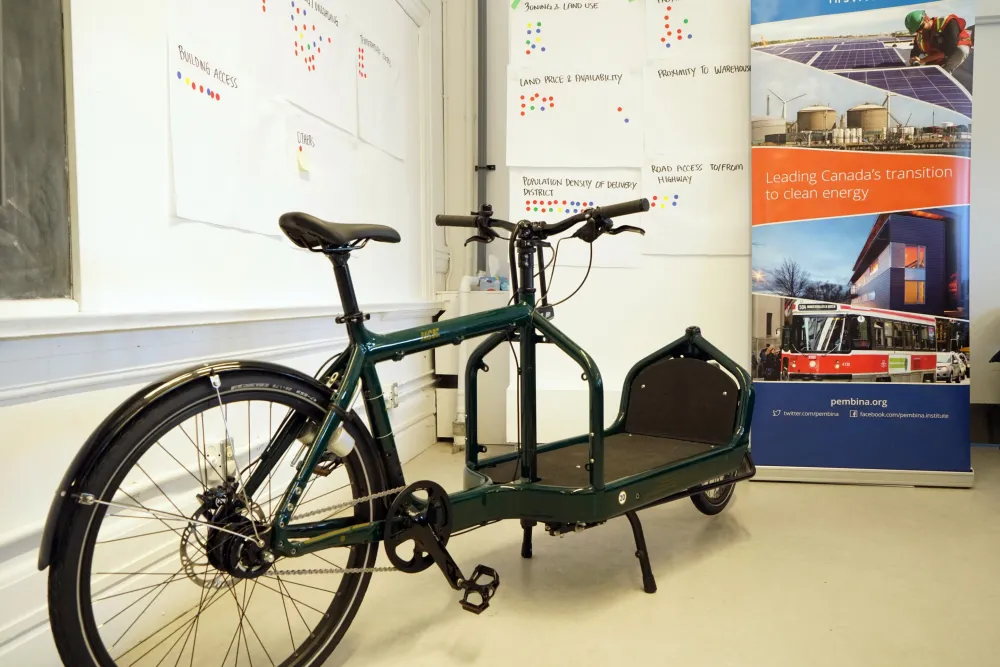Transportation accounts for approximately one-third of greenhouse gas emissions and is a primary source of air pollution in Toronto. Freight transportation in particular is a major contributor to greenhouse gas emissions — by 2030, it is expected that freight emissions in Canada will exceed passenger emissions. As e-commerce activity and the demand for same-day and home deliveries increases, we can expect more freight vehicles to be on the road, contributing to increased emissions and air pollution.
We know that we depend on goods movement as a major driver of the economy, and to bring Torontonians our every day needs that keep us fed, watered, and happy. So how can we satisfy our goods movement needs, while reducing the impact of urban freight activity? As we’ve highlighted in our recent factsheet, Modernizing Urban Freight Deliveries with Cargo Cycles, using cargo cycles for goods movement has the potential to address many of the challenges associated with last-mile deliveries in urban centres, including congestion, emissions, and limited curbside space.
Two weeks ago, the City of Toronto showed impressive leadership by passing two motions that made promising headway in reducing the number of trucks on the road. We have been researching and advocating for the benefits of moving more goods by cargo cycle for some time and needless to say, were thrilled to see this progress. First, the General Government and Licensing Committee approved an initative to test the use of cargo cycles for seasonal park maintenance in Allan Gardens. Although the pilot project still needs approval from city council, this initial support at the committee level demonstrates that the city recognizes the potential of cargo cycles to be an effective alternative to trucks, helping to reduce air pollution and congestion.
In addition to approving the Allan Gardens pilot project, the Infrastructure and Environment Committee passed a motion that requests city staff to propose a regulatory framework for low-speed wheeled modes under 25 km/hour, including e-assist cycles and cargo cycles. During our deputation to the Infrastrucure and Environment Committee, Pembina Institute showed support for the motion by highlighting our research on the opportunities for and benefits of using cargo cycles for goods movement in Toronto. We want to applaud Councillor Layton for his leadership in raising the motion, which will ultimately help provide businesses with the regulatory clarity they need to invest in their own cargo cycle fleets.
Beyond the technological innovation of using e-assisted cargo cycles for goods movement and city maintenance, what’s also meaningful is the cross-disciplinary approach that the city is taking in its actions. Different divisions at the City of Toronto, including Fleet Services, Parks, Forestry and Recreation, Transportation Services, Environment, and Energy are all involved in exploring the use of cargo cycles in Toronto. And that is exactly what the City of Toronto’s TransformTO Climate Action Strategy calls for — a multi-disciplinary approach to find practical solutions that improves quality of life by curbing greenhouse gas emissions.
Connecting urban freight with climate action
As the demand for goods movement increases, a larger number of freight vehicles on the road will put pressure on Toronto’s transportation network as more delivery vans and trucks compete for the same space as motorists, cyclists, and pedestrians. The result is increased traffic congestion, noise on our streets, and more competition for the curbside. This is not only problematic for residents, but for local businesses as well. Businesses spend approximately 28% of their total costs on conducting last-mile deliveries due to traffic congestion, a lack of loading zones, and other inefficiencies.
Many businesses in North American and European cities are piloting and deploying cargo cycles for goods movement, not only because they can be more efficient than conventional delivery vehicles, but because industry also wants to be part of the solution in reducing our carbon footprint. Although using cargo cycles for goods movement may not be appropriate in all contexts, our research and conversations with many companies in Toronto show that businesses are increasingly interested in using and testing cargo cycles in their delivery operations to explore the opportunities where it makes sense.
That said, some businesses are hesitant to do so, one reason being that existing regulations are unclear or restrict the use of certain types of e-assist cargo cycles. It is understandable that businesses are hesitant to test or invest in new delivery methods if they are unsure whether these methods will comply with the law.
Paving the way for urban freight innovations
We at the Pembina Institute are pleased to see the progress that the City of Toronto has made to help provide the regulatory clarity that businesses need to effectively integrate and test cargo cycles in their delivery operations, while also ensuring the safety of all road users.
In order to support businesses in adopting and testing innovative delivery solutions, while reducing emissions and addressing curbside competition and traffic congestion, we need policies to support alternative ways of moving goods in cities. The motions passed by the City of Toronto provide the groundwork to do exactly that.







